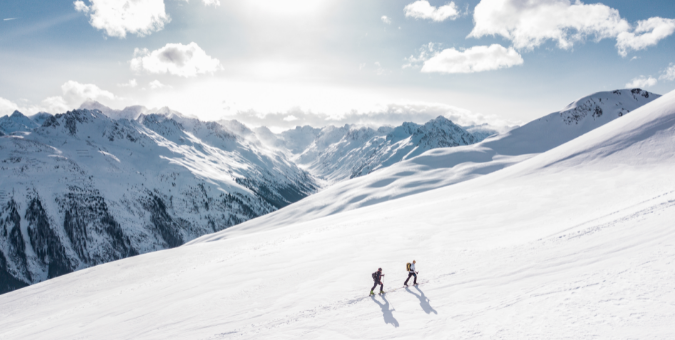
Much to everyone’s relief it looks like the French ski season is back on for those who had booked to travel to France from mid-January onwards. After many disappointed skiers had to either cancel or amend their French ski holiday plans in December following the announcement that all non-essential travel to the county was banned, this reopening is welcome news for many.
UK travellers could still visit other popular winter sport destinations such as Austria, Italy and Switzerland not to mention Andorra and Bulgaria, but for many France is the prime European skiing destination.
Whilst you no longer need an essential reason to travel to France if you are fully vaccinated, you are still required to provide a PCR test taken within 24 hours and you must also complete a “sworn statement” that you are not experiencing any Covid symptoms and have no knowledge of having been in contact with a confirmed case of COVID-19 during the last fourteen days prior to departure.
The form to complete can be found here.
Requirements if you are not fully vaccinated are different and you still require a compelling reason to travel.
As ever it is worth reviewing the UK travel website for updates as this continues to be a changing situation.
In France the other important requirement is the ‘pass sanitaire’ or health pass. In order to gain access to cafes, restaurants and bars, international travellers are required to prove they have been vaccinated or provide a negative Covid-19 test result carried out within 48 hours. For UK travellers the QR code issued by the NHS is recognised by the relevant app.
What to expect on your 2022 skiing holiday
Once you get to resort, things may be a little different this year and suggestions are that it may not be as easy to get lunch at a restaurant without pre-booking, or you may have to wait some considerable time. Therefore, you may need to consider returning to your accommodation for lunch or bringing something with you when you head out in the morning. It has to be said, there is nothing quite like eating squashed home-made sandwiches whilst sat safely in the snow soaking up the winter sunshine.
In order to restrict numbers, ski passes may be limited by resorts and if possibly you may want to purchase your lift pass early. Many ski packages include your ski pass so this may not be an issue for the majority of travellers.
You may be required to wear a face mask on gondolas and in other areas such as restaurants, bars and shops.
Following a day in the snow, if Après Ski is your next priority then depending on where you travel, you may be somewhat disappointed as restrictions on offerings may remain limited or reduced for some time yet. Masks are most likely to be a requirement and opening hours may be shorter than you are used to in previous years pre pandemic.
The number of ski instructors available may be limited so if you are booking lessons independently you may not have the usual choice of time slot or frequency of lessons.
Both Brexit and Covid have had a knock-on impact on staffing of chalets as employment requirements post Brexit of non-EU staff are now stricter. Therefore, you may see some changes in the way your chalet is staffed.
Skiing in 2022 – Insurance considerations
Given that Covid is still very much present, it is likely that travel and testing requirements will continue to change at short notice for some time to come. Therefore, having suitable insurance is as important as ever and having it in place from the date you book your holiday is strongly recommended. This is to ensure that cover is available from the date of the booking should anything change before your travel dates that impacts on you being able to go on holiday.
The usual pointers apply such as ensuring that you have;
- sufficient cover for all the activities you intend to partake in whether that be off piste skiing either guided or on your own, racing, using a snow park or sledging for example;
- declared all pre-existing medical conditions;
- complied with all resort requirements such as wearing a helmet;
- made yourself aware of policy requirements with regard to consumption of alcohol;
It goes without saying that you should also familiarise yourself with the FIS rules of skiing particularly if like many you have not been on the slopes for some considerable amount of time.
Tips following a skiing accident
Accidents do happen and if you are unfortunate enough to be involved in an accident whilst skiing it is worth bearing the following points in mind:
- If you are in a position to do so, make sure you exchange full contact details with any other party involved, including insurance details which you should carry with you. Otherwise, someone in your party should take responsibility for gathering this information.
- Take photographs of the accident location if possible. If a collision occurs on a piste, some wider views of the direction of travel of each of the parties are always helpful together with the name or number of the piste. Keep any GoPro or other video footage you may have of your descent and any collision.
- If you believe your accident is as a result of an issue with your bindings take photographs of the settings and keep any documents from the ski hire shop if the equipment is not your own.
- Make sure the accident is reported to any relevant authority and that you obtain a copy of any report or at least the report number if the full report is not available. It is much easier to do this whilst you are still in resort.
- If there are any witnesses to the incident, try and obtain their contact details in case they need to be contacted at a later stage.
- Keep any receipts for expenses incurred as a result of any accident.
- Contact your travel insurer as soon as possible so that you can comply with any requirements they may have under the terms of your policy.


















